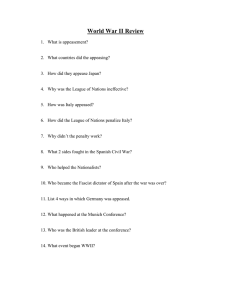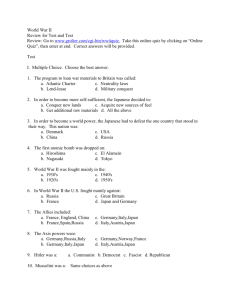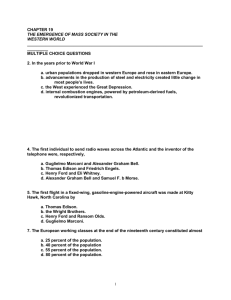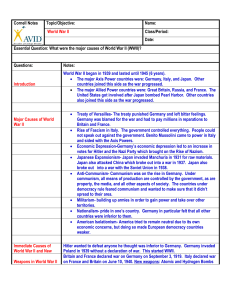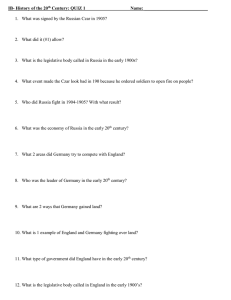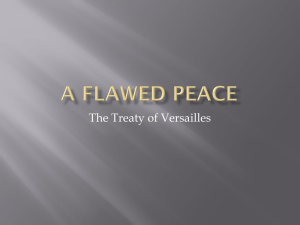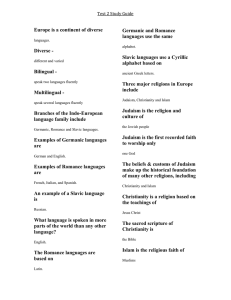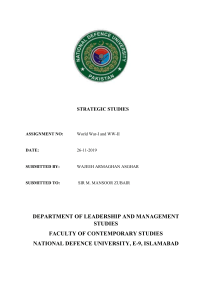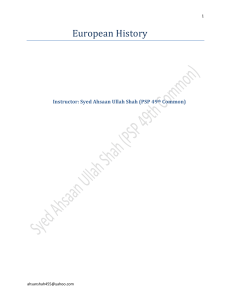Asquith & Grey of Falloden
advertisement
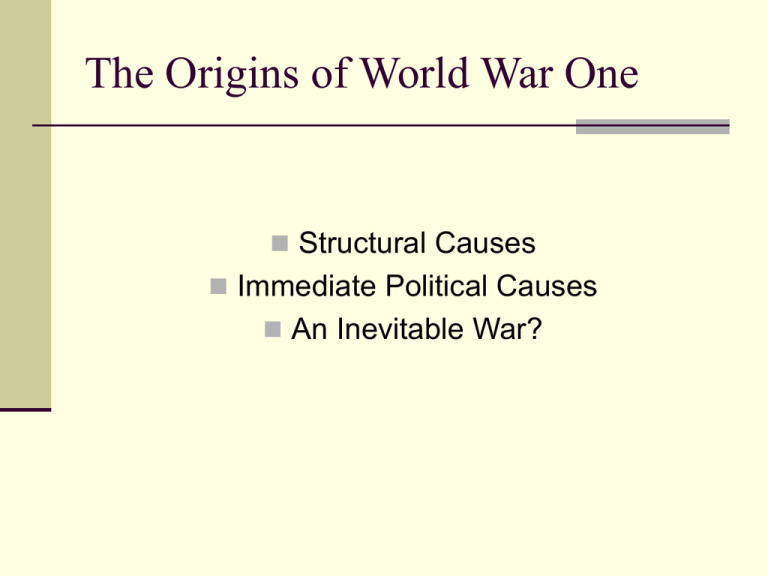
The Origins of World War One Structural Causes Immediate Political Causes An Inevitable War? Scrambling for Africa “We want eight, we won’t wait” The Dreadnought Crown Prince Wilhelm, 1913 Now certainly we must not thanklessly deny that a wave of economic prosperity brings with it much that is good. But the shady side of this too rapid development often manifests itself in a painful and threatening manner. Already the appreciation of wealth has gained in our country an importance which we can only observe with anxiety. The old ideals, even the position and the honour of the nation, may be sympathetically affected; for peace, peace at any price, is necessary for the undisturbed acquisition of money. But the study of history teaches us that all those States which in the decisive hour have been guided by purely commercial considerations have miserably come to grief. The sympathies of civilized nations are today, as in the battles of antiquity, still with the sturdy and the bold fighting armies; they are with the brave combatants who, in the words which Lessing puts in the mouth of Tellheim, are soldiers for their country, and fight out of the love which they bear to the cause. Certainly diplomatic dexterity can, and should, postpone the conflict for a time, and at times disentangle the difficulties. Certainly all those in authority must and will be fully conscious of their enormous responsibility in the grave hour of decision. They must make it clear to their own minds that the gigantic conflagration, once enkindled, cannot be so easily or so quickly extinguished. As, however, lightning is an adjustment of the tension between two differently charged strata of the atmosphere, so the sword will always be and remain until the end of the world the decisive factor. Austria-Hungary: Leaders Franz Josef & Berchtold Germany’s leaders Wilhelm II & Von Bethmann-Hollweg Asquith and Grey France’s Leaders Viviani & Poincaré A fatal wrong turning Sergei Sazonov & Nikola Pasic Moderates faced with impossible demands War Plan To War! How to treat the Kaiser Propaganda God and Nation Sonnino, Salandra, Vittorio Emmanuele Treaty of London, 1915 Extracts from The Treaty of London: [Great Britain, Parliamentary Papers, London, 1920, LI Cmd. 671, Miscellaneous No. 7, 2-7.] ARTICLE 1. A military convention shall be immediately concluded between the General Staffs of France, Great Britain, Italy, and Russia. This convention shall settle the minimum number of military forces to be employed by Russia against Austria-Hungary in order to prevent that Power from concentrating all its strength against Italy, in the event of Russia deciding to direct her principal effort against Germany.... ARTICLE 2. On her part, Italy undertakes to use her entire resources for the purpose of waging war jointly with France, Great Britain, and Russia against all their enemies. ARTICLE 3. The French and British fleets shall render active and permanent assistance to Italy.... ARTICLE 4. Under the Treaty of Peace, Italy shall obtain the Trentino, Cisalpine Tyrol with its geographical and natural frontier, as well as Trieste, the counties of Gorizia and Gradisca, all Istria as far as the Quarnero and including Volosca and the Istrian islands of Cherso and Lussin, as well as the small islands of Plavnik, Unie, Canidole, Palazzuoli, San Pietro di Nembi, Asinello, Gruica, and the neighbouring islets.... ARTICLE 5. Italy shall also be given the province of Dalmatia within its present administrative boundaries.... ARTICLE 6. Italy shall receive full sovereignty over Valona, the island of Saseno and surrounding territory....
